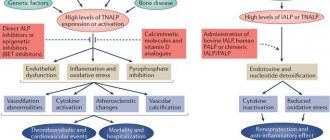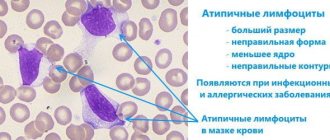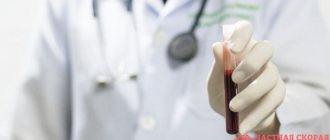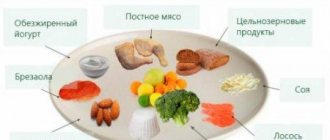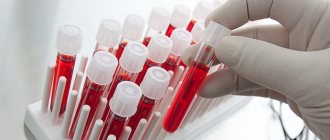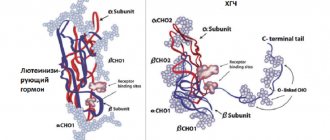Gastritis
Pancreatitis
Worms
59196 January 20
IMPORTANT!
The information in this section cannot be used for self-diagnosis and self-treatment.
In case of pain or other exacerbation of the disease, diagnostic tests should be prescribed only by the attending physician. To make a diagnosis and properly prescribe treatment, you should contact your doctor. We remind you that independent interpretation of the results is unacceptable; the information below is for reference only.
Vitamin B12: indications for prescription, rules for preparing for the test, interpretation of results and normal indicators.
general characteristics
It is an important vitamin that enters the body with food. Its level depends not only on intake, but also on the state of the gastrointestinal tract and hepatobiliary system. Deficiency leads to the development of hematopoietic disorders, damage to the nervous system, atrophic changes in the epithelium of the gastrointestinal tract, atherosclerosis, fatty hepatosis, and methylmalonic aciduria. Children with a genetic defect in the enzymes needed to convert vitamin B12 may develop megaloblastic anemia when blood levels of the vitamin are normal. Vitamin B12 is a cofactor for the enzyme homocysteine methyltransferase, which is involved in the conversion of homocysteine to methionine, which is important for the synthesis of phospholipids and the myelin sheath of neurons. Therefore, vitamin B12 deficiency is accompanied by neurological symptoms (mental disorders, polyneuritis, funicular myelosis - spinal cord damage).
Vitamin B12 deficiency
With a lack of vitamin B12, the following occurs:
- increased nervousness;
- pallor, yellowness of the skin;
- fast fatiguability;
- shortness of breath, difficulty breathing;
- lack of appetite;
- back pain;
- feeling of numbness in the muscles;
- diarrhea;
- inflammation of the tongue;
- redness, burning and increased sensitivity of the eyes to light;
- the appearance of ulcers in the corners of the mouth;
- depression.
The recommended intake of vitamin B12 for adults is 2.4 mcg per day. Vitamin B12 deficiency is especially dangerous for vegetarians, since they do not consume animal products. It is necessary to monitor its level in the blood and replenish its reserves either by injection or by taking tablets. The enemies of vitamin B12 are alcohol, estrogens and sleeping pills. This vitamin works well when combined with other B vitamins, as well as vitamins A, E and C. ⠀ If you feel a lack of vitamin B12, I recommend including these three dishes in your diet:
- beef stew with green beans;
- fish fricassee;
- salad with shrimp, herbs and avocado.
| Service | Price | Price | Promotion Price |
| Appointment with a therapist | primary 1800 rub. | repeat 1500 rub. | |
| Neurologist appointment | primary 1800 rub. | repeat 1500 rub. | free after MRI of the spine |
| Orthopedist appointment | primary 1800 rub. | repeat 1500 rub. | free after MRI of the joint |
| Consultation with an acupuncturist | primary 1800 rub. | repeat 1500 rub. | free after MRI of the spine |
| Vertebrologist consultation | primary 2000 rub. | repeat 1800 rub. | |
| Consultation with a chiropractor/osteopath | primary 2500 rub. |
| Service | Price according to Price | Discount | Discount |
| Plasma therapy of the spine or joint | 1 session 4000 rub. free doctor's appointment | 3 sessions 10,500 rub. free doctor's appointment | 5 sessions 17,500 rub. free doctor's appointment |
| Classic acupuncture session | 1500 rub. | ||
| Complex acupuncture session | 2000 rub. | ||
| Manual osteopathy session | 2500 rub. | ||
| Manual therapy session | 2500 rub. | ||
| Autohemotherapy | 550 rub. | 5 sessions 2500 rub. | 10 sessions 5000 rub. |
| Novocaine therapeutic blockade | 1500 rub. | ||
| Therapeutic paravertebral blockade | 1500 rub. | ||
| The blockade is therapeutic and medicinal, complex (use of several drugs) | 2000 rub. | ||
| Therapeutic intra-articular blockade with diprospan | 2500 rub. | ||
| Joint puncture with removal of synovial fluid | 2500 rub. | ||
| Intra-articular injection of hyaluronic acid (without the cost of the drug) | 2000 rub. | ||
| Novocaine therapeutic blockade | 1500 rub. | ||
| Therapeutic paravertebral blockade | 1500 rub. | ||
| Therapeutic intra-articular blockade with diprospan | 2500 rub. | ||
| Joint puncture with removal of synovial fluid | 2500 rub. | ||
| Pharmacocupuncture session (drug at the discretion of the doctor) | 2500 rub. | ||
| Pharmacocupuncture session (without the cost of the drug) | 2100 rub. | ||
| Electrophoresis session (without the cost of the drug) | 400 rub. | ||
| Phonophoresis session / Ultrasound therapy procedure (UT) (without the cost of the drug) | 450 rub. | ||
| Magnetic therapy session | 350 rub. | ||
| SMT therapy session (Sinusoidal modulated currents) | 450 rub. | ||
| Vitamin therapy (10 injections) | 4000 rub. free doctor's appointment | 3000 rub. free doctor's appointment | 3000 rub. free doctor's appointment |
| Injections (Vitamins B12) | 800 rub. | 800 rub. | 800 rub. |
| Intravenous administration of drugs | 450 rub. | 5 sessions 2140 rub. | 10 sessions 4050 rub. |
| Intravenous drip administration of drugs (without drugs, 1 bottle) | 800 rub. | 5 sessions 3375 rub. | 10 sessions 6750 rub. |
| Intravenous drip administration of medications (with existing clinic medications, 1 bottle) | 950 rub. | 5 sessions 4050 rub. | 10 sessions 8100 rub. |
| Intravenous drip administration of drugs (without drugs, 2 bottles) | 950 rub. | 5 sessions 4050 rub. | 10 sessions 8100 rub. |
| Intravenous drip administration of medications (with existing clinic medications, 2 bottles) | 1100 rub. | 5 sessions 4700 rub. | 10 sessions 9400 rub. |
| Subcutaneous/intradermal administration of drugs | 250 rub. | 5 sessions 1180 rub. | 10 sessions 2250 rub. |
| Intramuscular administration of drugs | 300 rub. | 5 sessions 1430 rub. | 10 sessions 2700 rub. |
Author: Telegina Natalya Dmitrievna
Therapist with 25 years of experience
Interpretation:
- Chronic renal failure, severe congestive heart failure, elevated transcobalamin levels, liver disease, acute and chronic myeloid leukemia, monocytic leukemia, erythroleukemia.
- Vitamin B12 deficiency. The main causes: atrophic gastritis, gastrectomy, stomach cancer, gastric polyposis, malabsorption syndrome, small intestinal cancer, chronic pancreatitis with impaired trypsin secretion, infestation with a broad tapeworm, whipworm.
Sample result (PDF)
B12 (cyanocobalamin)
B 12
(cyanocobalamin)
is a water-soluble B vitamin, which is a coenzyme of physiologically significant reactions. The vitamin is necessary for the formation and maturation of red blood cells, the synthesis of DNA and RNA, proteins, and amino acids. Vitamin B12 is not synthesized in the human body. The main source is animal products: milk, sour cream, meat, liver, fish, eggs. Human milk contains vitamin B12 in the form of methylcobalamin. This is the main form in which the vitamin is present in the human body.
In the bloodstream, the vitamin is transported to the bone marrow and other tissues through carriers - transcobalamins.
The main place of deposition of vitamin B12 is the liver. A large amount of it is absorbed by the spleen and kidneys, and somewhat less by the muscles. The total reserves of cobalamin in the adult human body are about 2–5 mg. Metabolism of the vitamin occurs very slowly and is excreted in bile. In the intestines, the bulk of the vitamin is reabsorbed.
Vitamin B12 has two coenzyme forms: methylcobalamin and deoxyadenosylcobalamin (cobamamide). The main function of active forms of coenzymes is the transfer of methyl one-carbon groups. Vitamin B12 is a cofactor in the conversion of homocysteine to methionine and takes part in the synthesis of acetate and deoxyribonucleotides.
Cyanocobalamin plays an important role in the metabolism of folic acid, in particular, promotes its transport into cells. With the participation of methylcobalamin, the body forms an active form of folic acid, which takes part in the synthesis of pyrimidine and purine bases and nucleic acids.
B deficiency12
With a lack of cobalamin, the most pronounced changes develop in proliferating cells: in the cells of the bone marrow, oral cavity, tongue and gastrointestinal tract. The changes lead to impaired hematopoiesis, the development of glossitis, stomatitis and intestinal malabsorption. Vitamin B12 promotes the accumulation of sulfhydryl groups in erythrocytes, mainly glutathione, so its deficiency leads to impaired division and maturation of erythrocytes and the development of megaloblastic anemia.
Vitamin B12 is a cofactor for the enzyme homocysteine methyltransferase, which is involved in the conversion of homocysteine to methionine. Methionine is necessary for the synthesis of phospholipids and the myelin sheath of neurons, therefore vitamin B12 deficiency is accompanied by neurological symptoms. Neurological symptoms of vitamin deficiency depend on the severity of the pathology. Early signs include dysfunction of the dorsal horns of the spinal cord with gait disturbance. Late manifestations are associated with lesions of the pyramidal, spinocerebellar and spinothalamic tracts; they are accompanied by muscle weakness, progressive spasticity, hyperreflexia, and scissor-like gait. With long-term and persistent deficiency of vitamin B12, dementia and neuropsychiatric disease occur.
Cyanocobalamin, participating in the synthesis of choline and methionine, has a beneficial effect on the liver and prevents the development of fatty hepatosis.
12
deficiency in children
Adenosylcobalamin serves as a coenzyme in the reaction of converting methylmalonic acid into succinic acid. Significant inhibition of the reaction due to B12 deficiency leads to the development of a life-threatening condition - methylmalonic aciduria. Clinically, the disease is manifested by a significant lag in the child’s weight, reduced tolerance to proteins, ketoacidosis, hypoglycemia, hyperammonemia and hyperglycinemia, and a high content of methylmalonic acid in the urine. The disease is not accompanied by the development of megaloblastic anemia.
Disorders of vitamin B12 metabolism occur in infants who have a genetic defect in the enzymes needed to convert vitamin B12 into coenzyme or low levels of the plasma carrier protein. The resulting megaloblastic anemia manifests itself already in the first weeks or months of life and is characterized by a normal or slightly reduced level of vitamin B12 in the blood. In contrast, with anemia that develops as a result of malabsorption, low levels of vitamin B12 are always detected.
Cyanocobalamin deficiency often develops in older people and is manifested by neurological disorders. It takes about 5–6 years for a vitamin deficiency to develop when its intake into the body is reduced. A decrease in the level of vitamin B12 is observed with pathology of the small intestine, alcoholism, helminthic infestation, taking cytostatics, aminoglycosides, and ascorbic acid.
Indications:
- differential diagnosis of macrocytic anemia;
- chronic inflammatory diseases and anatomical defects of the small intestine, atrophic gastritis;
- diagnosis of congenital forms of vitamin B12 deficiency;
- control of the condition during a strict vegetarian diet.
Preparation
No special preparation is required for the study. It is necessary to follow the general rules for preparing for research.
Interpretation of results
Units: pg/ml.
| From birth to 1 year | 159–1500 pg/ml |
| From 1 year to 2 years | 267–1500 pg/ml |
| From 2 to 8 years | 258–1013 pg/ml |
| From 8 to 14 years old | 201–1046 pg/ml |
| From 14 to 19 years old | 179–719 pg/ml |
| ≥ 19 years old | 180–914 pg/ml |
Boosting Vitamin B Levels12:
- acute and chronic hepatitis, liver cirrhosis, hepatic coma;
- erythroleukemia;
- metastases of malignant tumors to the liver;
- increased levels of transcobalamin;
- chronic renal failure;
- acute and chronic myeloid leukemia, monocytic leukemia.
Decreased vitamin B levels12:
- insufficient intake of vitamin B12 into the body;
- strict vegetarian diet;
- low vitamin content in human milk;
- alcoholism;
- impaired absorption of cobalamins;
- malabsorption syndrome in celiac disease, sprue;
- resection of the stomach, small intestine;
- chronic inflammatory diseases and anatomical defects of the small intestine, atrophic gastritis;
- parasitic infestations;
- Addison-Beermer disease (pernicious anemia - intrinsic Castle factor deficiency);
- Alzheimer's disease;
- congenital disorders of cobalamin metabolism;
- orotic and methylmalonic aciduria;
- transcobalamin deficiency;
- Immerslund-Gresbeck syndrome (congenital disorder of vitamin B12 transport through the intestinal wall, accompanied by proteinuria).
Signs and symptoms of vitamin B12 deficiency
- difficulty maintaining balance;
- fast heartbeat;
- numbness and tingling in the arms and legs;
- poor memory;
- pain in the mouth or tongue.
Infants with vitamin B12 deficiency may experience problems with movement in addition to developmental delays.
People with symptoms of pernicious anemia also need to have their vitamin B12 levels tested. Pernicious anemia, which causes low red blood cell counts, results from an inability to absorb vitamin B12. Pernicious anemia often affects older people.
Symptoms of pernicious anemia
- constipation;
- fatigue;
- loss of appetite;
- pale skin;
- weakness;
- weight loss.
High serum folate levels may mask the symptoms of vitamin B12 deficiency and worsen its neurological symptoms. Serum folate is the level of folate in the blood.
Abnormally high levels of vitamin B12 may be an early sign of liver disease, diabetes, or certain types of leukemia. Your doctor can use the results of a vitamin B12 test to make a correct diagnosis.
